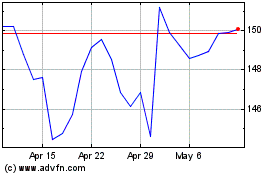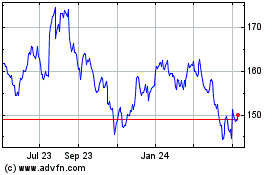By Denise Roland
Jean-Paul and Martine Clozel had to sell their house and work
out of a rented garage when they started biotech company Actelion
Ltd.
Twenty years later, after selling the Swiss company to Johnson
& Johnson in an unusual, $30 billion deal, the husband-and-wife
team is starting over again. They are embarking on the creation of
a new global biotech player -- armed with nearly $1 billion in
capital, a deep-pocketed partner in J&J and soon, a stock
listing in Zurich.
Dr. Clozel, 61 years old, is slated to walk away with about $1.5
billion for his 5% stake in Actelion. Johnson & Johnson
persuaded him to sell only after agreeing to let him strip out
Actelion's early-stage research and development to form a separate
company.
The U.S. health-care giant, eager to replenish its pipeline as
some top-selling drugs face competition from cheaper competitors,
was willing to pay a hefty price tag. That, and its agreement to
the unorthodox deal structure, cleared a hurdle that tripped up
previous Actelion suitors: Dr. Clozel's well-telegraphed reluctance
to give up his independence over years of deal speculation.
"My first reaction to J&J was that I didn't want to sell,"
Dr. Clozel said in an interview. He now will become chief executive
of the new firm, which doesn't yet have a name. Along with his
wife, he will be free to pursue research that spans insomnia, lupus
and neurological diseases.
Johnson & Johnson will hold on to a 16% stake in the new
firm, with an option to double that. The rest will be spun off
later this year to existing Actelion shareholders, giving Dr.
Clozel a 4.2% stake. Johnson & Johnson is expected to provide
more detail on the portfolio in a prospectus for the new company in
coming weeks.
"We know they know how to develop and market drugs," said Daniel
Koller, lead manager at BB Biotech, a longtime investor in
Actelion.
The biotech industry is a key player in the global
pharmaceuticals industry. These research-focused drug-discovery
companies blossomed amid a wave of genetic-engineering advances in
the 1970s and '80s. They tend to stay small and nimble, marketing
only a few drugs they develop, or selling promising drugs to bigger
companies.
But some have grown into pharmaceutical giants in their own
right. Actelion is Europe's biggest by market capitalization, but
it is dwarfed by the likes of Amgen Inc. and Gilead Sciences Inc.
of the U.S.
Johnson & Johnson first approached Actelion in January of
last year. At first, the two companies discussed collaborating, but
J&J then said it wanted to buy Actelion, according to a J&J
filing the following month.
Negotiations stumbled on price. Actelion Chairman Jean-Pierre
Garnier broached the idea of a spinoff. In November, the two sides
disclosed talks.
French company Sanofi SA jumped in the following month, The Wall
Street Journal reported. Sanofi, referred to only as "company A" in
J&J's filing, offered a higher price. J&J wouldn't match
it. Then, Sanofi went back on its offer price, according to the
filing, and Actelion turned back to J&J, which clinched the
deal in January.
Sanofi declined to comment.
Dr. Clozel, a cardiologist, and his wife, Martine, a
pediatrician and also 61, met as medical students in France in
1975. They both joined Roche Holding AG about a decade later and
ended up working on cardiovascular drugs.
Dr. Clozel said he became disillusioned in the mid-1990s, when
he said the company pushed scientists to concentrate on specific
diseases, instead of taking their research in whichever application
seemed most promising.
Jonathan Knowles, Roche's former head of research and
development, said the Clozels' program didn't fit the company's
strategy at the time because it didn't cater to common conditions
such as high blood pressure. A Roche spokesman declined to comment
on the company's past strategy but said that today its scientists
"have a lot of freedom to pursue their own projects."
In 1997, the Clozels quit their jobs at the Swiss drug giant to
set up Actelion in the rented garage in Allschwil, Switzerland,
with two former Roche co-workers. The Clozels sold their house to
contribute funding.
"We had no money; we had no technology, no patents," he said.
The quartet planned to continue the work they had started at Roche,
which had focused on the inner lining of blood vessels, or
endothelium.
The following year, Roche shut down its cardiovascular research
program and agreed to license two of its shelved drugs -- both of
which had been discovered by the Clozels and their team -- to
Actelion. One of those drugs ended up working for patients with a
rare condition known as pulmonary arterial hypertension, or PAH.
Marketed as Tracleer, it pushed Actelion into profitability, and
went on to become a global blockbuster. Actelion listed in
2000.
Dr. Clozel struggled to repeat that success. In 2011, after a
string of clinical-trial failures, Elliott Advisors, an activist
fund, tried to replace management. Dr. Clozel convinced
shareholders to stick with him. The next year, he struck gold
again, notching a big clinical-trial success with its new PAH drug,
Opsumit.
--Jonathan D. Rockoff and Ben Dummett contributed to this
article.
Write to Denise Roland at Denise.Roland@wsj.com
(END) Dow Jones Newswires
March 02, 2017 07:14 ET (12:14 GMT)
Copyright (c) 2017 Dow Jones & Company, Inc.
Johnson and Johnson (NYSE:JNJ)
Historical Stock Chart
From Mar 2024 to Apr 2024

Johnson and Johnson (NYSE:JNJ)
Historical Stock Chart
From Apr 2023 to Apr 2024
